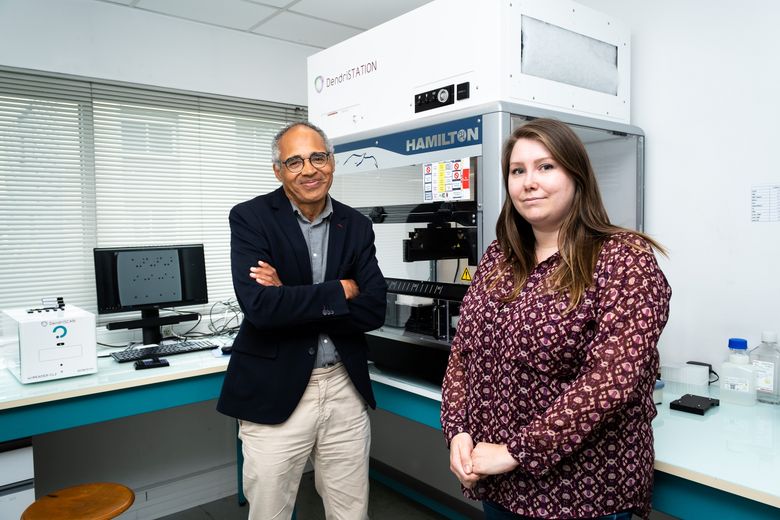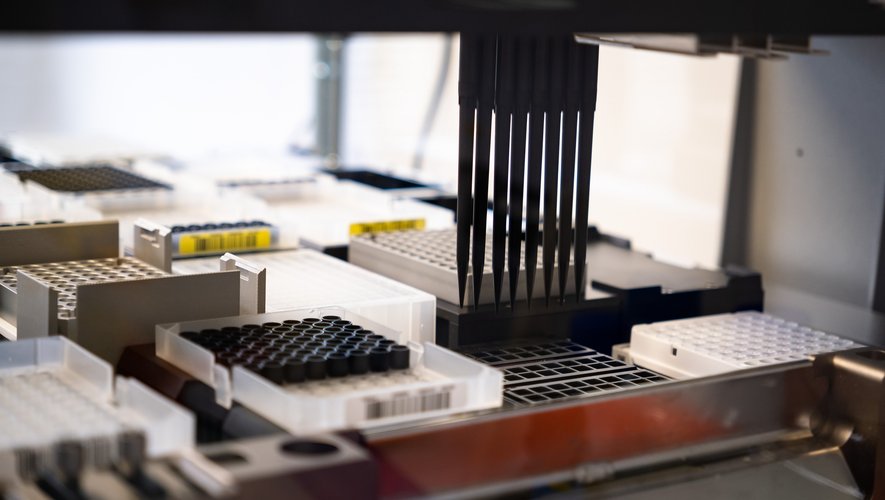The Toulouse start-up Dendris has developed an innovative technology that allows faster and more precise detection of bacteria, viruses and fungi. A major challenge in the face of the development of epidemics.
Since 2009, the start-up Dendris has been working on biological screening for infectious diseases. To go faster and further in the detection of pathogens, it offers a new generation of diagnostic tools based on bioengineering and artificial intelligence.
“Since the end of the nineteenthe century and the work of Pasteur and Koch, most infectious diseases are detected from samples (in the stool, throat, on the nails, the skin, etc.) placed in culture. Today, 80% of diagnoses are made after this culture. But, in virology, it is not effective, which is why PCR was invented in the 1980s, to directly seek the DNA of the virus without depending on culturing or the conditions of this culture. But it is necessary to multiply the PCR to seek all the germs, like a knitting machine which would carry out 30 to 40 passages. Little by little we are moving on to molecular biology, the switchover was made with the Covid-19 epidemic, the laboratories renewed their machines and trained their teams”, explains Richard Fabre, medical biologist, president co-founder of Dendris.
Covid, dengue, chikungunya: constant infectious risks
Between multiple PCR (multiplex PCR which allows ten PCRs to be carried out simultaneously) and DNA sequencing, which is expensive and is carried out in a university hospital center (CHU), the Dendris team offers a technology that can be used in medical biology laboratories. “We looked for a technique that goes further than multiplex PCR and that can be done routinely to replace the culture technique from A to Z. Covid-19 has shown that the risk of infection is a major risk for eight billion people. individuals. And, with the presence of the tiger mosquito, Occitanie is exposed to the risk of dengue fever and chikungunya epidemics”, underlines Richard Fabre.

Richard Fabre, biologist, president and co-founder of Dendris, and Elodie Bernard, biological engineer, production manager at Dendris.
From his meeting with Jean-Marie François, professor at INSA Toulouse (National Institute of Applied Sciences), and Jean-Pierre Majoral, then director of research at the CNRS, Dendris was born, which today employs 12 people and works with 90% equity. With the support of French Tech Toulouse, Dendris has developed a bio-chip based on dendrimers, a family of macromolecules organized in the form of a tree. “The surface of the chip – a glass slide – contains 300 pins of DNA fragments in order to search for around fifty bacteria, viruses, or fungal infections, and to go further than the family of these pathogens, such as resistance to an antibiotic”, explains the biologist.
5 hours between arrival at the laboratory and the results
The innovation then comes from reading the information from the chip. “There are 300 probes on the slide, so 300 signals to analyze. As our chip is robust, the signal generated by the bacteria is constant. We were able to teach the machine to recognize them (“machine learning”). When a sample arrives at the laboratory, it only takes 5 hours between DNA extraction and the results.This is a huge time saver in cases of dermatophytes (fungi on the nails or scalp) where the in culture takes four weeks and where, in the meantime, the patient is treated with an antifungal which is not necessary in 40% of cases”.
Upcoming clinical trials
Since this year, Dendris has been selling two molecular diagnostic kits (CE marking was obtained in 2019 and 2022). Two private laboratories are currently equipped with it, one in Muret and another in the North of France. The Toulouse company is in negotiations with several hospitals to participate in clinical trials. Including the AP-HP (Assistance publique-hôpitaux de Paris), the civil hospices of Lyon, the CHU of Nîmes and the IHU (University hospital institute) Méditerranée Infection in Marseille.

